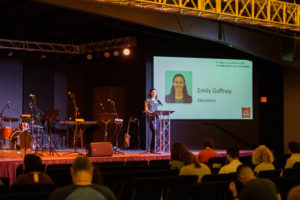Speaker at The Charlotte Justice Conference
October 9, 2019
Heart Executive Director Emily Gaffney led the “Education and Childhood Trauma” session at the Charlotte Justice Conference on 10/5/19. The second annual conference was organized by Christine Nicodemus and Heart tutor Tim Nicodemus and had around 115 guests in attendance at Project 658.
Emily offered context and statistics from CMS’s bold Breaking The Link report. The report begins with history of integration and re-segregation of Charlotte schools before sharing that a predictive link still exists between race, school poverty level, and academic outcomes – hence the name of the report. The report shares that while the graduation rate in CMS is 85%, only 56% of CMS juniors scored the minimum ACT score required to be eligible for a NC system university (17). Breaking this down by race, 37% of black students and 42% of Latino students met the minimum ACT score requirement. CMS is focused on reducing the predictability of who succeeds academically.
Education issues begin early, with a shortage of preschool teachers and seats, followed by kindergarten and elementary teachers who must address a wide variety of academic and other needs, and students who are promoted to subsequent grade levels without meeting the learning standards of the prior grades. In math, specifically, even students who are meeting grade level standards in elementary school (49% on 2017 NAEP) may fall behind in future years. More students fall behind each year between 3rd and 8th grade, as math levels progress. Students who are relying on memorization in the early years may not have built a strong enough foundation to support higher levels of math understanding.
Interventions like Heart Tutoring seek to build a strong foundation for students who missed key skills in prior years, thus increasing students’ chances of understanding grade level content and having a strong foundation to support higher levels of math learning.
Academic needs may not be the only thing impacting our students. The education sector is building a growing awareness of the impacts of trauma and is shifting the question from, “What is wrong with this person?” to “What may have happened to this person?” Adverse Childhood Experiences (ACEs) have long-term impacts on physical health and behavioral needs at alarming rates. Some children are able to build resiliency to the negative impacts, often through having a support system and responsive, empowering adult relationships. Our organization is taking small steps to building a fuller picture of students’ holistic needs in part by partnering with Charlotte Resilience Project to host screenings of the film Resilience. Volunteers and the public are welcome to attend a showing hosted at on Monday, November 18th (RSVP here).
In closing, Emily offered the following resources and action steps to conference participants:
Learning
- CMS’s Breaking The Link report
- Leading On Opportunity report
- Charlotte Resilience Project film showings
Tutoring / Volunteering
- Heart Tutoring – 1 hr/wk, math games & activities
- Read Charlotte – 1 hr / wk, literacy (fluency)
- Alpcharlotte.org – significant commitment, deep literacy intervention
- Communities In Schools – Social Capital Investor, Success Coach
Categories
- Blog (252)
- Events (28)
- Grants and Funding News (33)
- Heart Families (9)
- Heart News (152)
- Heart Staff (16)
- Math Matters (38)
- Press (65)
- Student Spotlight (1)
- Uncategorized (43)
- Volunteer Partners (12)
- Volunteer Resources (41)
- Volunteer Spotlight (52)
Recent Posts
- 2025 Volunteer Appreciation Month Spotlight Series
- Tutor Spotlight: LaShurn Purnell
- 2024 NAEP Results
- Heart Featured on Charleston’s Live 5 News
- Racing to 100 Tutors Across the Carolinas!
- Accelerate and Johns Hopkins University Visit HMT Tutoring Session
- Tutor Spotlight: Libby Anderson
- Tutor Spotlights: Alyson and Michael Fotia
- Heart Featured on Winston-Salem’s WXII 12 News
- Volunteer with Heart!


